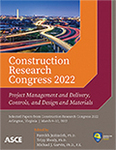Feasibility of an Integrated Heuristic and Machine Learning Approach for Schedule Health Monitoring in Construction
Publication: Construction Research Congress 2022
ABSTRACT
Project planning and controls requires planners to continuously revise project schedules to meet evolving requirements and constraints during a construction. Such an activity is usually performed under strict deadlines and planners are often forced to set aside good planning principles to deliver the updated schedules on time. To assist planners with validating their schedules, this paper explores the feasibility of using an integrated approach based on heuristics and machine learning methods to check the quality of a construction schedule. Specifically, building on the predefined rules and heuristics formulated in the Defense Contract Management Agency (DCMA)’s 14 Point Schedule Quality Assessment, this paper explores the feasibility of heuristic-based and deep learning methods to assess a project schedule health from qualitative and quantitative perspectives. Experimental results from thirty-five real-world projects are presented which demonstrate the feasibility of these underlying methods in highlighting schedule deviations from industry guidelines as well as following the best planning practices. A path forward toward a completely automated schedule health assessment system is discussed in detail.
Get full access to this article
View all available purchase options and get full access to this chapter.
REFERENCES
Amer, F., and Golparvar-Fard, M. (2019). “Automatic understanding of construction schedules: Part-of-activity tagging.” In Vol. 1 of Proc., 2019 European Conf. for Computing in Construction, 190–197. Dublin, Ireland: Univ. College Dublin.
Amer, F., and Golparvar-Fard, M. (2021). “Modeling dynamic construction work template from existing scheduling records via sequential machine learning”. Adv. Eng. Inf., 47, 101198.
Bragadin, M. A., and Kähkönen, K. (2016). “Schedule health assessment of construction projects.” Construct. Manage. Econ., 34(12), 875–897.
Bojanowski, P., Grave, E., Joulin, A., and Mikolov, T. (2017). Enriching word vectors with subword information. Transactions of the Association for Computational Linguistics, 5, 135–146.
Cherneff, J., Logcher, R., and Sriram, D. 1991. “Integrating CAD with construction-schedule generation.” J. Comput. Civ. Eng., 5 (1): 64–84.
DCMA (Defense Contract Management Agency). (2012). Earned value management system (EVMS) program analysis pamphlet (PAP), Department of Defense, Washington, DC, USA.
De La Garza, J. M., and Ibbs, C. W. 1990. “Knowledge-elicitation study in construction scheduling domain.” J. Comput. Civ. Eng., 4 (2): 135–153.
Dzeng, R. J., and Lee, H. Y. (2004). “Critiquing contractors’ scheduling by integrating rule-based and case-based reasoning.” Autom. Constr. 13 (5): 665–678.
Echeverry, D., Ibbs, C. W., and Kim, S. (1991). “Sequencing knowledge for construction scheduling.” J. Constr. Eng. Manage., 117(1), 118–130.
Farzad Moosavi, S., and Moselhi, O. (2014). “Review of detailed schedules in building construction.” J. Leg. Aff. Dispute Resolut. Eng. Constr. 6 (3), 05014001.
GAO (Government Accountability Office). (2012). GAO Schedule Assessment Guide, GAO-12-120G, GAO, Washington, DC.
Kavada, A., Dharsandiaa, R., Hosnya, A., and Nik-Bakhta, M. (2019). “Schedule Quality Assessment for nD Models using Industry Foundation Classes”. In Proc., ISARC. the International Symposium on Automation and Robotics in Construction (Vol. 36, pp. 1050–1056). IAARC Publications.
Koo, B., Fischer, M., and Kunz, J. (2007). “Formalization of construction sequencing rationale and classification mechanism to support rapid generation of sequencing alternatives”. J. Comput. Civ. Eng., 21(6), 423–433.
Mikulakova, E., König, M., Tauscher, E., and Beucke, K. (2010). “Knowledge-based schedule generation and evaluation.” Adv. Eng. Inf. 24 (4): 389–403.
Moosavi, S. F., and Moselhi, O. (2012). “Schedule assessment and evaluation.” In Proc., Construction Research Congress 2012: Construction Challenges in a Flat World (pp. 535–544).
NDIA ICPM (National Defense Industrial Association Industrial Committee for Program Management). (2011). Planning and scheduling excellence guide (PASEG)., NDIA, Arlington, VA.
Navinchandra, D., Sriram, D., and Logcher, R. D. (1988). “GHOST: project network generator.” J. Comput. Civ. Eng. 2 (3): 239–254.
Russell, A. D., and Udaipurwala, A. (2000). “Assessing the quality of a construction schedule.” In Proc., Construction Congress VI: Building Together for a Better Tomorrow in an Increasingly Complex World (pp. 928–937).
Shaked, O., and Warszawski, A. (1995). “Knowledge-based system for construction planning of high-rise buildings.” J. Constr. Eng. Manage. 121 (2): 172.
Zhao, X., Yeoh, K. W., and Chua, D. K. H. (2020). “Extracting construction knowledge from project schedules using natural language processing.” In Proc., 10th Int. Conf. on Engineering, Project, and Production Management, (pp. 197–211). Springer, Singapore.
Information & Authors
Information
Published In
History
Published online: Mar 7, 2022
Authors
Metrics & Citations
Metrics
Citations
Download citation
If you have the appropriate software installed, you can download article citation data to the citation manager of your choice. Simply select your manager software from the list below and click Download.
